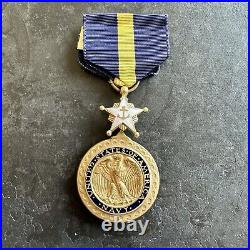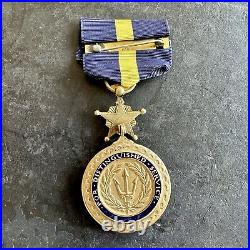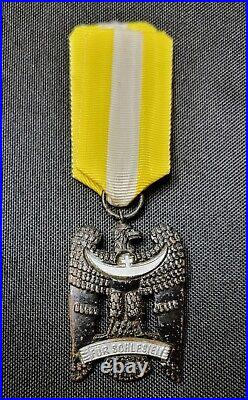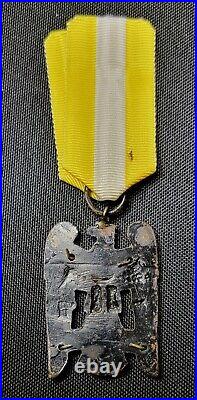LOT of 35 ITEMS. These items have some wear from normal wear. All items in the photos are included. The WWI Victory medal has 5 bars and a star. There are some French medals including a CHATEAY-THIERRY. Nothing has been added or taken out of the lot. This is the I received it. (see photos for more details). Additional photos available upon request. Please specify details you would like to see more clearly.
ORIGINAL WORLD WAR I UNITED STATES NAVY VICTORY MEDAL W/ MINE SWEEPING CLASP, & FULL WRAP BROOCH. RIBBON DRAPE TESTED U. The World War I Victory Medal is a service medal of the United States military which was first created in 1919, designed by James Earle Fraser. The medal was originally intended to be created due to an act of the United States Congress, however the bill authorizing the medal never passed, leaving the service departments to create the award through general orders. The United States Army published orders authorizing the World War I Victory Medal in April 1919 and the U. Navy followed in June of that same year. Known until 1947 simply as the “Victory Medal”, the World War I Victory Medal was awarded to any member of the U. Military who had served in the armed forces between the following dates in the following locations. 6 April 1917 to 11 November 1918 for any military service. 12 November 1918, to 5 August 1919 for service in European Russia. 23 November 1918, to 1 April 1920 for service with the American Expeditionary Force Siberia. The front of the bronze medal features a winged Victory holding a shield and sword on the front. The back of the bronze medal features “The Great War For Civilization” in all capital letters curved along the top of the medal. Curved along the bottom of the back of the medal are six stars, three on either side of the center column of seven staffs wrapped in a cord. The top of the staff has a round ball on top and is winged on the side. The staff is on top of a shield that says “U” on the left side of the staff and “S” on the right side of the staff. On left side of the staff it lists one World War I Allied country per line: France, Italy, Serbia, Japan, Montenegro, Russia, and Greece. On the right side of the staff the Allied country names read: Great Britain, Belgium, Brazil, Portugal, Rumania (spelled with a U instead of an O as it is spelled now), and China. Please let me know if there’s anything else I can do for you!
More good photos in the discription, have a look! Original and beautiful legacy from. WW I brave German. Fighter pilot in the “Flying Circus”! We have posted more beautiful photos here for you. Consists of the Iron Cross 1st Class, magnetic, three-part, domed design. 935 silver stamp, fine award for an German pilot officer. Iron Cross 2nd Class on a ribbon. Three-part, magnetic, S&W stamp for Schneider and Wagner on the ribbon ring. Very nice condition of the Iron Cross with a wide frame and a beautiful blackening. Pilot’s badge in the version awarded up to 1918. Hollow design with beautiful frosted silver plating. Also an expert opinion from a leading specialist shop. Very good condition of the badge. The pin system is completely intact. We are offering this legacy together. Further inquiries are welcome. You will receive further information after purchasing the medals and decorations.
These medals were manufactured in Germany and feature a design that represents military service during World War I. The lot also includes ribbons for each medal, adding to their historical significance as collectible militaria items from the original period. Also included is one (1) ribbon bar. The maker marks present are: PLS, 0.2, B. L and AD. B.
The makers mark W m w hard to see. The main stick pin was replaced in 1940s, I could polish but I like the patina on it. The Iron Cross (EK) was originally a Prussian, later German war decoration, which was introduced by the Prussian King Frederick William III. March 1813 in Breslau was founded in three classes for the course of the wars of liberation. [1] The first Iron Cross was awarded by Friedrich Wilhelm III. Personally to his deceased wife Luise posthumously. King Wilhelm I of Prussia repeated the founding of the Iron Cross with the outbreak of the Franco-Prussian War on 19 June 1841. Renewed in his capacity as Prussian King on 8. August 1914 the foundation again and through its broad awarding practice made the Iron Cross a quasi-German order.












































































